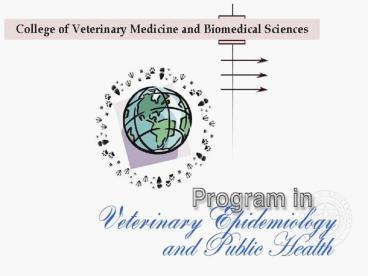Epidemiology Signature Program - PowerPoint PPT Presentation
1 / 24
Title:
Epidemiology Signature Program
Description:
Epidemiology Signature Program – PowerPoint PPT presentation
Number of Views:80
Avg rating:3.0/5.0
Title: Epidemiology Signature Program
1
(No Transcript)
2
Epidemiology Signature Program
- Present
- Future
- Research
- Education
- Service
3
What is Epidemiology?
- The study of the distribution and determinants of
health-related states or events in specified
populations, and the application of this study to
control of health problems (Last, 2001) - If you dont know the secret handshake, you can
always use the password - Descriptive and analytical are the primary
adjectives
4
So, what about all those other adjectives in
epidemiology?
- Veterinary versus human epidemiology
- The old epizootiology debate
- The other adjectives
- E.g., cancer, chronic diseases, environmental,
nutritional, social, molecular, etc. - These might well arise from the ongoing debate
As a discipline is it a science, or
method? - Spanning from the basic building blocks
(molecular and cellular) to the individual, herd,
societal, ecological level
5
How did we get here?
Pre-victorian Soho (London)
Outbreak investigation
A rather dour physician
Modern-day
groupies
Recurring handle disappearances
Restoration of the pump
Removal of the pump handle
6
Present-day Research at CVM-TAMU
- Some brief examples of research efforts by many
of the epidemiology faculty - Not an exhaustive list!
- Representative of the breadth and depth of the
areas of research - Non-attributed
7
Companion Animal Epidemiology
- Risk factors for clinically important diseases
- Data on pet ownership and pet health practices
- Information about free-roaming cats and their
relationship to humans, other animals and the
environment - Data on methods to control free-roaming cat and
dog populations
8
Diagnostic Test Evaluation (Clinical and Field
Epidemiology)
- Work with Plum Island researchers on high
consequence pathogen detection systems - Johnes disease test evaluation under field
conditions and in diagnostic laboratory settings
(PCR, culture, serology) - Identifying the causes of false-positive
reactions to the serum ELISA test for MAP - NIRS for paratuberculosis
9
Environmental Epidemiology
- Effects of air emissions from petroleum industry
on cattle health - Effects of air emissions from aluminum and
plastics industries on cattle health and oysters
in Texas - Landscape / land-use and climate change impacts
on animal and human health
10
Equine Epidemiology
- The equine epidemiology program focuses on the
conduct of observational studies of horse
populations. - Several recent articles in AVMA journals
regarding new syndromes have highlighted these
efforts - E.g., Reproduction failure in Kentucky mares
11
Food Safety
- Antimicrobial resistance (AMR)
- Swine organic versus traditional agriculture
- Integrated populations of humans and swine
- AMR management in feedlot cattle
- Moral economy of antimicrobial use
- Salmonella and other enteric bacteria
- Unique surveillance schemes
12
Foreign Animal Diseases
- ICAB/FAZD Centers
- Vulnerability among feral swine
- Premise of premises
- Supporting the engine of an epidemiological
model - Modeling of transmission dynamics in extensive
range conditions
13
Other Infectious Diseases
- Infectious disease epidemiology
- Some current projects
- Simulation of outbreaks in Texas domestic and
wild animal populations - West Nile virus
- equine vectors forecasting systems
- Tuberculosis in Texas cattle
- Paratuberculosis control programs
14
Production Animals
- Familial risk of infection with Mycobacterium
avium ssp. paratuberculosis in Texas Longhorn
cattle. - Culling and production effects of MAP infection
15
Spatial Epidemiology
- Disease risk (spatial processes)
- Salmonella spp. in dairy herds in Texas
- M. paratuberculosis in beef herds in Texas
- The role of pesticide dispersion within Texas
watersheds in childhood cancers.
16
Epidemiology Education
- Graduate
- Traditionally, epidemiology has been taught at
the graduate level - Professional
- VIBS 930 (public health, zoonoses, food safety,
clinical epidemiology) to 3rd yr (now 2nd year) - Planned electives with VLACS/VIBS faculty
- Undergraduate
- BIMS students
17
Graduate Epidemiology Education
- Masters of Science in Epidemiology
- Oldest in Texas!!!
- Masters of Science (College-wide)
- Masters of Veterinary Public Health
- Example on following slides from new funding
- PhD (College-wide under development)
- Presently track in VIBS or VTPB
18
Master of Veterinary Public Health
- Create a multi-disciplinary curriculum to fulfill
the Department of Homeland Securitys objectives
of prevention, detection, response and recovery - Collaborate with the National Center for Foreign
Animal and Zoonotic Disease Defense - Provide veterinarians necessary tools to obtain
federal, state or industry employment in
biodefense and public health
19
Where are Veterinarians Needed?
20
Facilities
?
?
?
21
Ongoing Developments in Epidemiology at CVM-TAMU
- One recent signature program hire (Ward
infectious diseases modeling) and one newly
confirmed hire (Budke epidemiology of zoonotic
macroparasites) (biodefense and emerging
infectious diseases) - One open position signature program search
ongoing in analytical epidemiology
22
Ongoing Developments in Epidemiology at CVM-TAMU
- Education graduate student stipends and
recruitment for DHS Center positions - PhD in Veterinary Biomedical Sciences with
Epidemiology track - Electives for professional students and
clinical/research faculty collaborations - New graduate courses (spatial epidemiology,
infectious diseases modeling, surveillance
methods, etc.) - Closer ties to SRPH regarding courses and
research
23
Ongoing Developments in Epidemiology at CVM-TAMU
- Research plans
- Multiple pilot projects underway
- Antimicrobial resistance management
- Increasing compliance with pre-harvest food
safety programs - Biomonitors for infectious diseases surveillance
- NIH R01 possibilities
- Involvement with new Center grants
24
TO BRAG AS LUSTILY AS CHANTICLEER IN THE
MORNING, STANDING ON HIS ROOST Thoreau
- We are a very active and growing program
- developing a strong reputation for research
- establishing our graduate program to compete with
other universities for domestic and international
students - Faculty are from multiple and varied training and
backgrounds and departments - Tracks to becoming an epidemiologist are varied
an asset - Rapidly being established as one of the foremost
North American veterinary programs in
epidemiology (and worldwide) - Peer institutions
- UC Davis, Cornell, Minnesota
- Massey (NZ), Guelph (Canada), EU countries































